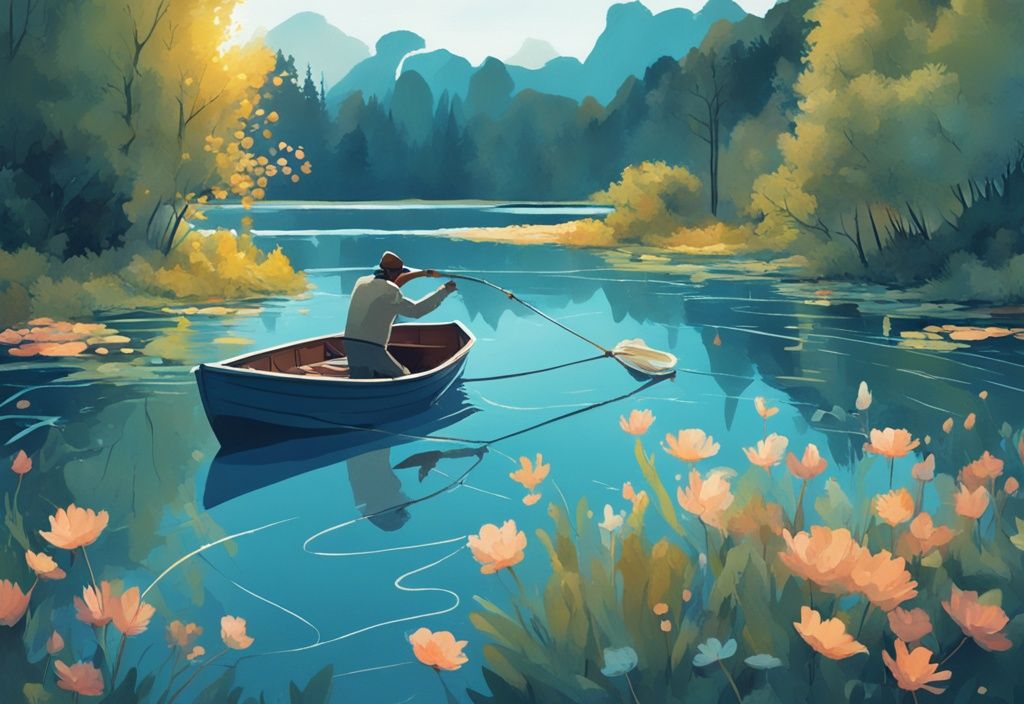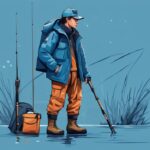Ever wondered, “when is fishing season?” Ponder no more, mates! With all the diverse species and worldwide locations, it can feel like navigating a nautical chart during a storm. But don’t worry, I’ve got your six!
In this handy guide, we’re gonna dive into the fishing seasons of 2024. We’ll reel in everything from the perfect time for nabbing bass and bluegill, to untangling the knots of local regulations. We’re not just bobbing around in the shallow end here – we’re talking global fishing, mates!
And because we all want to knot our lines for many years to come, we’ll also touch on ethical fishing practices. So, are you ready to net the knowledge that’ll keep both your bucket and our beautiful oceans full? Dive in!
Understanding the Basics of Fishing Seasons
Fishing seasons are crucial for both the sport and conservation of fish species. They are periods when fishing is regulated, ensuring that anglers can enjoy their hobby while fish populations are sustainably managed. This section delves into what fishing seasons are and how they vary by fish species.
What is a Fishing Season?
A fishing season is a designated period during which it’s legal and ideal to fish for specific species. Authorities like state or provincial regulations, along with considerations such as spawning times and fish population numbers, set these seasons. The goal? Sustainability and conservation of fish stocks are crucial, and understanding different fishing techniques can play a significant role. Fishing seasons differ vastly across species and geographical regions. For those interested in diving deeper into specialized fishing equipment, it’s important to learn what a fishing leader is and its importance in sustainable practices. Typically, there are two phases: open season and closed season. During the open season, fishing is permitted and encouraged, giving anglers the chance to catch their targeted species. In contrast, the closed season acts as a protective interval for fish to spawn and grow, ensuring future fish populations.
Fishing Seasons by Fish Species
Fishing regulations focus on conserving fish stocks and ensuring sustainability. Different species have specific seasons tailored to their biological and environmental needs. For example, popular species like bass, trout, salmon, and walleye each have their designated seasons that vary by region. These seasons are influenced not only by legal regulations but also by weather conditions and fish spawning times, which affect the activity and availability of fish year-round.
Additionally, some regions have unique ice fishing seasons during the winter months, complete with their own sets of guidelines and regulations. Ice fishing offers a unique opportunity to pursue favorite species in a completely different setting, adding variety to the fishing experience.
By understanding when is fishing season in your area and for your targeted species, you can plan your fishing outings more effectively. Plus, you’ll be contributing to conservation efforts that ensure fishing remains a sustainable activity.
Fish Species and Their Seasons
Fishing season varies widely depending on the species. Here, I dive into the best times to catch some popular fish:
When is Bass Fishing Season?
Bass fishing can be enjoyed all year, but the peak months—March, April, May, and June—are prime time. During these months, bass are more active and eager to bite. Just remember, from the second Saturday in April to the second Saturday in June, you’ll need to practice catch-and-release to help protect their spawning grounds.
Suitable Season for Bluegill Fishing
Bluegill are a delight for anglers because they’re available year-round. The best periods to catch these little fighters are from March to July and in November. Whether you’re casting off a dock or fishing from a boat, bluegill are plentiful and on the move during these times. A successful trip is almost guaranteed.
Season Timings for Crappie (Specks) Fishing
For crappie, or “specks” as they’re affectionately known, the prime season stretches from January through May. These months coincide with their pre-spawn and spawning phases, making them easier to find. The good times don’t end there; September through December also offers fantastic opportunities. During these months, crappie retreat to deeper waters, but they’re still fairly predictable—perfect for a well-planned fishing outing.
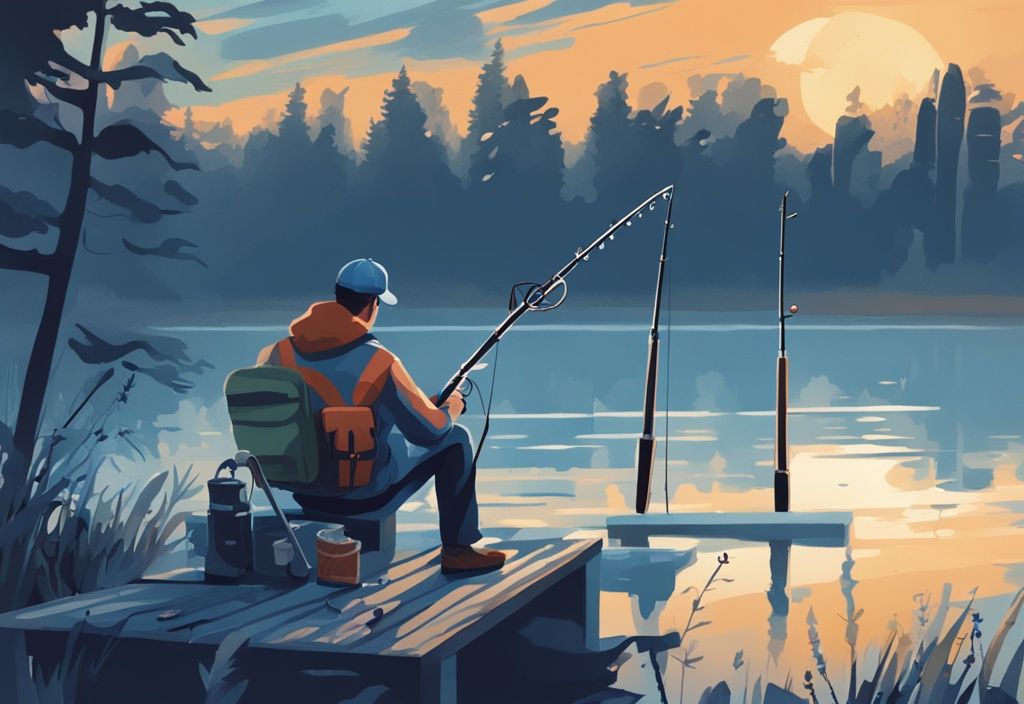
Best Time for Catfish Fishing
Catfish are the year-round stalwarts of the fishing world. That said, May to November stands out as peak catfish months. During this period, water temperatures rise, catfish activity spikes, and so do your chances of reeling in a big one. Days on the water can be downright electrifying during these months.
Peacock Bass Fishing Seasons
Peacock bass fishing is all about timing. The hot months are April through June and then again in September, October, and November. When conditions are just right, these fish are aggressive and strangely predictable. These windows of opportunity align perfectly with their feeding habits and environmental comfort zones, making it prime time for any angler hoping to land a trophy fish.
Fishing Season by Location
Fishing Season in Washington State
Washington State, the Evergreen State, is a treasure trove for fisherfolk. From the abundant waters of Puget Sound to the tranquil rivers and lakes, knowing when is fishing season can make or break your trip. Catching the right season for each species is your ticket to an exceptional fishing experience. Ever wondered when’s the best time to cast your line?
Key fishing seasons:
- Trout and Salmon Regular Season: Imagine the excitement at 8 a.m. on the first Saturday in April, running right until midnight on Labor Day. This is prime time for trout and salmon in Washington’s diverse waters.
- Trout and Salmon Extended Season: Can’t get enough? There’s more! From January 1 to February 18, then again from the day after Labor Day to December 31. Extra time to perfect your trout and salmon game.
- Muskellunge, Pike, Pickerel, and Bass: You can chase these big catches year-round, but remember, specific seasonal restrictions might pop up to protect these populations.
- Walleye and Sauger: Their season runs from January 1 to March 14, then picks up again on the first Saturday in May, and goes all the way to December 31. These windows help maintain a healthy population balance.
Remember, regulations can change, so always grab the latest annual fishing pamphlet from state authorities before you head out.
Global Fishing Seasons of Interest
When is fishing season worldwide? It varies greatly, shaped by local ecosystems and the behavior of different fish species. Curious about global fishing hotspots?
- Salmon Runs in Alaska and the Pacific Northwest: Famous for epic salmon runs starting in late spring and peaking in summer. Depending on your spot and salmon species, this season can extend into fall. It’s a fishing spectacle you won’t want to miss.
- Trout Season in the Great Lakes Region: Think spring and fall. The Great Lakes are trout heaven during these times when trout move to shallower waters to spawn. It’s a dance of nature and a boon for anglers.
- Marlin Season in the Gulf of Mexico: If you’re after the adrenaline rush of marlin fishing, head to the Gulf from summer through early fall. Trolling is the go-to technique to lure these swift giants. Feel the thrill as they dart through the water!
Fishing techniques vary with the species and the season. Fly fishing works wonders for active trout, while trolling is your best bet for catching salmon during their runs. Knowing when is fishing season for your target area and species is key to maximizing your efforts and staying within the rules.
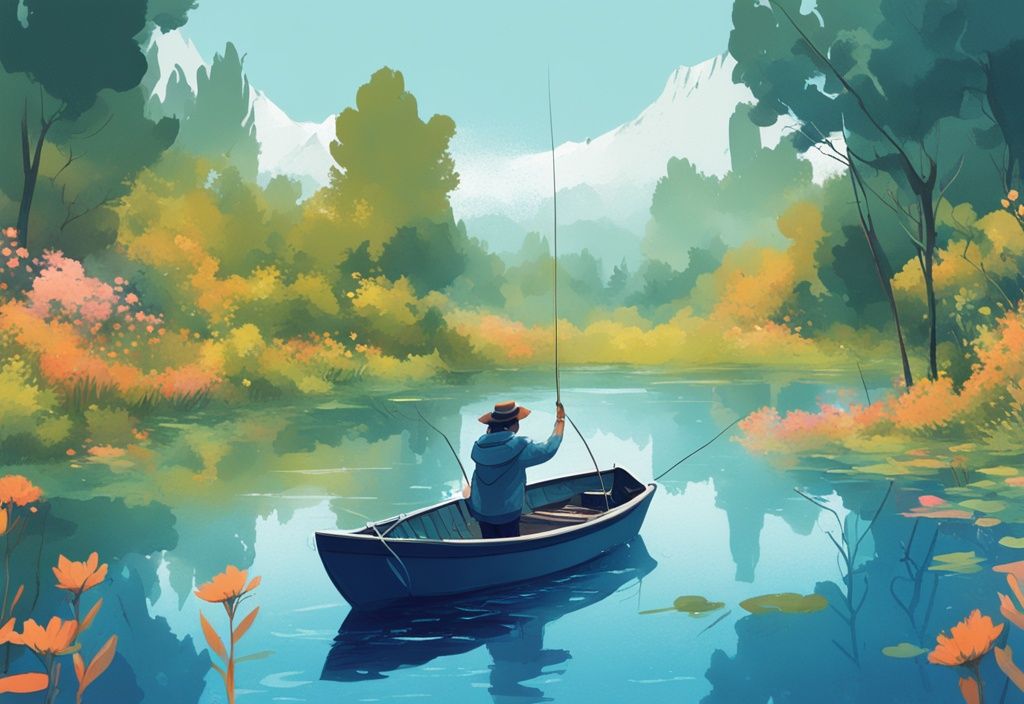
Knowing Fishing Regulations and Seasons
Fishing regulations and the timing of fishing seasons are essential to understand for any angler. This section delves into why these rules are crucial and how they affect your fishing experiences.
Fishing Regulations and Why They’re Important
Fishing regulations play an indispensable role in the conservation and sustainability of fish populations. Imagine tossing your line into waters teeming with healthy fish—these regulations ensure that vision. They’re crafted based on solid scientific research, examining fish populations, spawning cycles, and environmental conditions. You wouldn’t want to face hefty fines or penalties, right? Keeping up with when is fishing season is just part of respecting these regulations.
Each year, factors like ecological changes and conservation needs might shift fishing seasons. Therefore, always check the latest local regulations before you head out. These protections aren’t just rules; they’re a promise to future generations that they’ll also enjoy plentiful fishing opportunities.
Catch and Size Limits
Catch and size limits are another cornerstone of fishing regulations. They help manage fish populations, giving each fish a fair shot at reaching maturity and spawning. Picture this: you catch a tiny fish, but it’s not time to celebrate. That little guy needs to grow and reproduce to keep the ecosystem alive. Size limits protect these younger fish, while catch limits set a cap on your daily harvest to prevent overfishing.
Following these limits might seem like a hassle, but think about the bigger picture. These rules ensure that fishing remains a sustainable and enjoyable activity. Next time you’re on the water, remember that each respectful catch contributes to the balance of our aquatic world.
Ethical Fishing Considerations
Ethical considerations in fishing are just as crucial as the regulations themselves. Imagine disrupting a spawning season—overfishing can have a ripple effect, disturbing the entire ecosystem. Practicing catch and release, especially during those critical times, helps maintain balance.
Think about those closed seasons; they’re designed to protect fish during their most vulnerable periods. By respecting them, you’re aiding in the regeneration and growth of fish populations. Use proper techniques to minimize harm when releasing fish. Every action counts towards a healthier aquatic environment, ensuring our fishing adventures remain vibrant and fulfilling.
So, next time you head out, keep all these factors in check. Enjoy the thrill, respect the rules, and contribute to conserving the wonderful world beneath the water’s surface.
Fishing Seasons Preparation
How to Check Local Fishing Regulations
Understanding when is fishing season in your area is crucial for a successful and legal fishing experience. To find up-to-date regulations, start by visiting government websites that regularly update their fishing guidelines. These sites will provide comprehensive information on the current rules and seasonal changes.
Additionally, join local fishing clubs or associations. These groups often have resources including newsletters and forums where seasoned anglers share real-time information. Fishing apps are another excellent way to stay informed, as many offer up-to-the-minute updates on regulations tailored to your location.
Don’t forget to download annual fishing pamphlets offered by local authorities. These pamphlets usually provide a thorough overview of the year’s fishing rules and highlight any recent emergency rule changes to ensure you stay compliant.
Need-to-Know on Booking Guided Fishing Trips
When is fishing season and how can you make the most of it? Booking a guided fishing trip is a smart move for beginners. Imagine the thrill of having an expert by your side, upping your chances for a stellar catch while keeping you safe and abiding by the law. Experienced guides possess up-to-date knowledge on current fishing regulations and prime fishing spots.
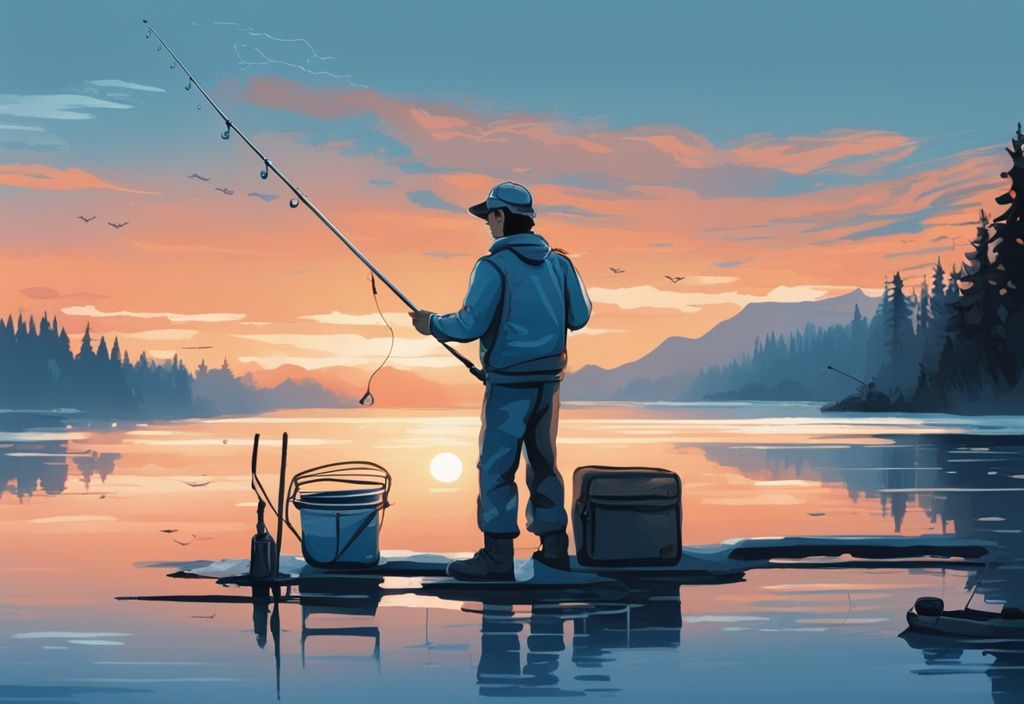
Before you book, check the guide’s credentials and reviews to ensure you’re getting someone reliable. A good guide knows the ins-and-outs of local seasons and regulations and will offer invaluable advice. Whether catching bass in the spring or ice fishing in winter, a guide can make a significant difference to your angling adventure.
Gathering Info on Fishing Licenses
Understanding when is fishing season doesn’t exempt you from needing a fishing license. Most regions require anglers to obtain a license, which often comes with a guide to local fishing seasons and regulations. Securing a license not only keeps you on the right side of the law but also contributes to conservation efforts through the fees collected.
Licensing requirements vary, so always check with local authorities or government websites for specifics. In some cases, fishing licenses are easily available online, while others might require an in-person visit to a licensed vendor. Make sure to renew your license annually and stay informed about any changes in local laws or seasons.
Conclusion
Understanding when is fishing season is fundamental for both novice and seasoned anglers. Knowing when specific fish species are legally and ideally caught ensures an uninterrupted fishing experience while being environmentally responsible. Fishing seasons highlight the vital role these regulations play in preserving aquatic ecosystems. For instance, seasons are designed to protect fish during their spawning times, preventing overfishing and ensuring that species populations remain healthy and robust.
Moreover, adhering to designated fishing seasons is more than just about compliance with the law; it’s about contributing to long-term conservation efforts. Ethical fishing practices—like observing catch and size limits and respecting closed seasons—are crucial for maintaining the balance between recreational fishing and natural habitat sustainability. This balance enables anglers to enjoy their favorite pastime without harming fish populations or the broader ecosystem.
In conclusion, familiarity with fishing seasons enriches the fishing experience and fosters a sense of responsibility towards nature. It’s imperative for all fishing enthusiasts to stay informed about when is fishing season in their respective regions, adhering to the regulations set by authorities. By doing so, anglers ensure the sustainability of fishing resources for future generations and contribute positively to the conservation of diverse fish species and their habitats.
Frequently Asked Questions
Understanding Fishing Season and Regulations
When is the Best Month for Bass Fishing?
Ah, bass fishing—there’s nothing like it! The best months for bass fishing are March, April, May, and June. These months line up perfectly with the pre-spawn and spawning periods. Imagine bass teeming with energy, making them more active and yes, much easier to catch. So, grab your gear and head out; the waters are practically begging you to cast a line!
Why Are There Designated Fishing Seasons?
Ever wondered why fishing seasons are a thing? Well, designated fishing seasons are crucial for conserving fish populations. They give fish a chance to spawn and grow. By doing so, we prevent overfishing and ensure our beloved fisheries remain bountiful for future generations. It’s a way to respect the natural cycle and enjoy the sport responsibly.
What Factors Determine Fishing Seasons?
Fishing seasons aren’t arbitrary; they are determined by several factors. State or provincial regulations play a huge role. Then there are the fish species’ spawning times—some fish like their privacy! Population numbers and weather conditions can also affect when you can fish. Regional differences are significant too. So, next time you wonder, “When is fishing season?”, think of all these moving parts!
Can I Fish Anywhere Year-Round?
Wish you could fish anywhere, anytime? Unfortunately, that’s not the case. Not all locations or species have open fishing seasons year-round. There are specific regulations and closed seasons designed to protect fish during vulnerable periods. Always, and I mean always, check local regulations before casting your line. It’s all about keeping our waters rich with life.
